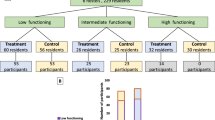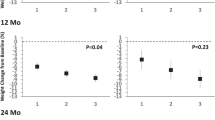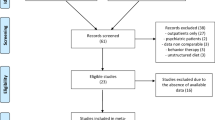Abstract
Objective:
Overweight and obesity are epidemic in populations with serious mental illnesses. We developed and pilot-tested a behavioral weight-loss intervention appropriately tailored for persons with serious mental disorders.
Methods:
We conducted a single-arm pilot study in two psychiatric rehabilitation day programs in Maryland, and enrolled 63 overweight or obese adults. The 6-month intervention provided group and individual weight management and group physical activity classes. The primary outcome was weight change from baseline to 6 months.
Results:
A total of 64% of those potentially eligible enrolled at the centers. The mean age was 43.7 years; 56% were women; 49% were white; and over half had schizophrenia or a schizoaffective disorder. One-third had hypertension and one-fifth had diabetes. In total, 52 (82%) completed the study; others were discharged from psychiatric centers before completion of the study. Average attendance across all weight management sessions was 70% (87% on days participants attended the center) and 59% for physical activity classes (74% on days participants attended the center). From a baseline mean of 210.9 lbs (s.d. 43.9), average weight loss for 52 participants was 4.5 lb (s.d. 12.8) (P<0.014). On average, participants lost 1.9% of body weight. Mean waist circumference change was 3.1 cm (s.d. 5.6). Participants on average increased the distance on the 6-minute walk test by 8%.
Conclusion:
This pilot study documents the feasibility and preliminary efficacy of a behavioral weight-loss intervention in adults with serious mental illness who were attendees at psychiatric rehabilitation centers. The results may have implications for developing weight-loss interventions in other institutional settings such as schools or nursing homes.
This is a preview of subscription content, access via your institution
Access options
Subscribe to this journal
Receive 12 print issues and online access
$259.00 per year
only $21.58 per issue
Buy this article
- Purchase on Springer Link
- Instant access to full article PDF
Prices may be subject to local taxes which are calculated during checkout


Similar content being viewed by others
References
Colton CP, Ronald W, Manderscheid P . Congruencies in increased mortality rates, years of potential life lost, and causes of death among public mental health clients in eight states. Prev Chronic Dis 2006; 3: 1–14.
Brown S . Excess mortality of schizophrenia. A meta-analysis. Br J Psychiatry 1997; 171: 502–508.
Allison DB, Newcomer JW, Dunn AL, Blumenthal JA, Fabricatore AN, Daumit GL et al. Obesity among those with mental disorders: a National Institute of Mental Health Meeting Report. (review and special article). Am J Prev Med 2009; 36: 341–350.
Daumit GL, Goldberg RW, Anthony C, Dickerson F, Brown CH, Kreyenbuhl J et al. Physical activity patterns in adults with serious mental illness. J Nerv Ment Dis 2005; 193: 641–646.
Lindamer LA, McKibbin C, Norman GJ, Jordan L, Harrison K, Abeyesinhe S et al. Assessment of physical activity in middle-aged and older adults with schizophrenia. Schizophr Res 2008; 104 (1–3): 294–301.
Amani R . Is dietary pattern of schizophrenia patients different from healthy subjects? BMC Psychiatry 2007; 7: 15.
McCreadie RG . Diet, smoking and cardiovascular risk in people with schizophrenia: descriptive study. Br J Psychiatry 2003; 183: 534–539.
Strassnig M, Brar JS, Ganguli R . Nutritional assessment of patients with schizophrenia: a preliminary study. Schizophr Bull 2003; 29: 393–397.
Sachs GS, Guille C . Weight gain associated with use of psychotropic medications. J Clin Psychiatry 1999; 60 (Suppl 21): 16–19.
Lieberman JA, Stroup TS, McEvoy JP, Swartz MS, Rosenheck RA, Perkins DO et al. Effectiveness of antipsychotic drugs in patients with chronic schizophrenia. N Engl J Med 2005; 353: 1209–1223.
McIntyre RS, Mancini DA, Basile VS . Mechanisms of antipsychotic-induced weight gain. J Clin Psychiatry 2001; 62 (Suppl 23): 23–29.
Mueser KT, McGurk SR . Schizophrenia. Lancet 2004; 363: 2063–2072.
Ball MP, Coons VB, Buchanan RW . A program for treating olanzapine-related weight gain. Psychiatr Serv 2001; 52: 967–969.
Kalarchian MA, Marcus MD, Levine MD, Haas GL, Greeno CG, Weissfeld LA et al. Behavioral treatment of obesity in patients taking antipsychotic medications. J Clin Psychiatry 2005; 66: 1058–1063.
Menza M, Vreeland B, Minsky S, Gara M, Radler DR, Sakowitz M . Managing atypical antipsychotic-associated weight gain: 12-month data on a multimodal weight control program. J Clin Psychiatry 2004; 65: 471–477.
Richardson CR, Avripas SA, Neal DL, Marcus SM . Increasing lifestyle physical activity in patients with depression or other serious mental illness. J Psychiatr Pract 2005; 11: 379–388.
Vreeland B, Minsky S, Menza M, Rigassio Radler D, Roemheld-Hamm B, Stern R . A program for managing weight gain associated with atypical antipsychotics. Psychiatr Serv 2003; 54f: 1155–1157.
McKibbin CL, Patterson TL, Norman G, Patrick K, Jin H, Roesch S et al. A lifestyle intervention for older schizophrenia patients with diabetes mellitus: a randomized controlled trial. Schizophr Res 2006; 86: 36–44.
Brar JS, Ganguli R, Pandina G, Turkoz I, Berry S, Mahmoud R . Effects of behavioral therapy on weight loss in overweight and obese patients with schizophrenia or schizoaffective disorder. J Clin Psychiatry 2005; 66: 205–212.
Chen CK, Chen YC, Huang YS . Effects of a 10-week weight control program on obese patients with schizophrenia or schizoaffective disorder: a 12-month follow-up. Psychiatry Clin Neurosci 2009; 63: 17–22.
Littrell KH, Hilligoss NM, Kirshner CD, Petty RG, Johnson CG . The effects of an educational intervention on antipsychotic-induced weight gain. J Nurs Scholarsh 2003; 35: 237–241.
Lindenmayer JP, Khan A, Wance D, Maccabee N, Kaushik S, Kaushik S . Outcome evaluation of a structured educational wellness program in patients with serious mental illness. J Clin Psychiatry 2009; 70: 1385–1396.
Weber M, Wyne K . A cognitive/behavioral group intervention for weight loss in patients treated with atypical antipsychotics. Schizophr Res 2006; 83: 95–101.
Des Jarlais DC, Lyles C, Crepaz N . Improving the reporting quality of nonrandomized evaluations of behavioral and public health interventions: the TREND statement. Am J Public Health 2004; 94: 361–366.
Appel L, Champagne C, Harsha D, Cooper LS, Obarzanek E, Elmer PJ et al. Effects of comprehensive lifestyle modification on blood pressure control: main results of the PREMIER Clinical Trial. Writing Group of the PREMIER Collaborative Research Group. JAMA 2003; 289: 2083–2093.
White WB, Anwar YA . Evaluation of the overall efficacy of the omron office digital blood pressure HEM-907 monitor in adults. Blood Press Monit 2001; 6: 107–110.
Rowlands AV, Thomas PW, Eston RG, Topping R . Validation of the RT3 triaxial accelerometer for the assessment of physical activity. Med Sci Sports Exerc 2004; 36: 518–524.
Larsson UE, Reynisdottir S . The six-minute walk test in outpatients with obesity: reproducibility and known group validity. Physiother Res Int 2008; 13: 84–93.
Matthews DR, Hosker JP, Rudenski AS, Naylor BA, Treacher DF, Turner RC . Homeostasis model assessment: insulin resistance and beta-cell function from fasting plasma glucose and insulin concentrations in man. Diabetologia 1985; 28: 412–419.
Russo J, Trujillo CA, Wingerson D, Decker K, Ries R, Wetzler H et al. The MOS 36-Item short form health survey: reliability, validity, and preliminary findings in schizophrenic outpatients. Med Care 1998; 36: 752–756.
Lehman AF . Measurement of quality of life among persons with severe and persistent mental disorders. Soc Psychiatry Psychiatr Epidemiol 1996; 31: 78–88.
Radloff L . The CES-D scale: a self-report depression scale for research in the general population. Appl Psych Meas 1977; 1: 385–401.
Block G, Clifford C, Naughton MD, Henderson M, McAdams M . A brief dietary screen for high fat intake. J Nutr Educ 1989; 21: 199–207.
Block G, Gillespie C, Rosenbaum EH, Jenson C . A rapid food screener to assess fat and fruit and vegetable intake. Am J Prev Med 2000; 18: 284–288.
Schwarzer R . Measurement of Perceived Self-Efficacy: Psychometric Scales for Cross-Cultural Research. Berlin, Forschung and der Freien Universitat; Berlin, 1993.
Sallis JF, Pinski RB, Grossman RM, Patterson TL, Nader PR . The development of self-efficacy scales for health-related diet and exercise behaviors. Health Education Research 1988; 3: 283–292.
Gormally J, Black S, Daston S, Rardin D . The assessment of binge eating severity among obese persons. Addict Behav 1982; 7: 47–55.
Derogatis LR, Lipman RS, Covi L . SCL-90: an outpatient psychiatric rating scale—preliminary report. Psychopharmacol Bull 1973; 9: 13–28.
Dickerson F, Boronow JJ, Stallings C, Origoni AE, Cole SK, Yolken RH . Cognitive functioning in schizophrenia and bipolar disorder: comparison of performance on the repeatable battery for the assessment of neuropsychological status. Psychiatry Res 2004; 129: 45–53.
Gold JM, Qeern C, Iannone VN, Buchanan RW . Repeatable battery for the assessment of neuropsychological status as a screening test in schizophrenia I: sensitivity, reliability, and validity. Am J Psychiatry 1999; 156: 1944–1950.
Derogatis LR . SCL-90-R administration, scoring and procedures manual, 3rd Edn. NCS Pearson, Inc.: Minneapolis, MN, 1994.
Stamler R, Stamler J, Gosch FC, Civinelli J, Fishman J, McKeever P et al. Primary prevention of hypertension by nutritional-hygienic means. Final report of a randomized, controlled trial. JAMA 1989; 262: 1801–1807.
Stevens VJ, Obarzanek E, Cook NR, Lee IM, Appel LJ, Smith West D et al. Long-term weight loss and changes in blood pressure: results of the trials of hypertension prevention, phase II. Ann Intern Med 2001; 134: 1–11.
Melamed Y, Stein-Reisner O, Gelkopf M, Levi G, Sivan T, Ilievici G et al. Multi-modal weight control intervention for people with persistent mental disorders. Psychiatr Rehabil J 2008 Winter; 31: 194–200.
Moher D, Schulz KF, Altman D . The CONSORT statement: revised recommendations for improving the quality of reports of parallel-group randomized trials. JAMA 2001; 285: 1987–1991.
Acknowledgements
Funding was received from NIMH Grant R34070368. Dr Daumit, Dr Crum and Dr Appel have received NIH funding for their work. This study was funded by the NIMH, although the NIMH was not involved in the study design, data collection or analysis or decision to publish
Author information
Authors and Affiliations
Corresponding author
Ethics declarations
Competing interests
The authors declare no conflict of interest.
Rights and permissions
About this article
Cite this article
Daumit, G., Dalcin, A., Jerome, G. et al. A behavioral weight-loss intervention for persons with serious mental illness in psychiatric rehabilitation centers. Int J Obes 35, 1114–1123 (2011). https://doi.org/10.1038/ijo.2010.224
Received:
Revised:
Accepted:
Published:
Issue Date:
DOI: https://doi.org/10.1038/ijo.2010.224
Keywords
This article is cited by
-
Evaluating a pilot community-based FITMIND exercise programme for psychosis in Hong Kong
BMC Psychiatry (2023)
-
Using motivational techniques to reduce cardiometabolic risk factors in long term psychiatric inpatients: a naturalistic interventional study
BMC Psychiatry (2018)
-
Physical activity and quality of life in long-term hospitalized patients with severe mental illness: a cross-sectional study
BMC Psychiatry (2017)
-
Diabetes and Cardiovascular Care Among People with Severe Mental Illness: A Literature Review
Journal of General Internal Medicine (2016)
-
A Nutritional Intervention to Reduce the Calorie Content of Meals Served at Psychiatric Rehabilitation Programs
Community Mental Health Journal (2011)



